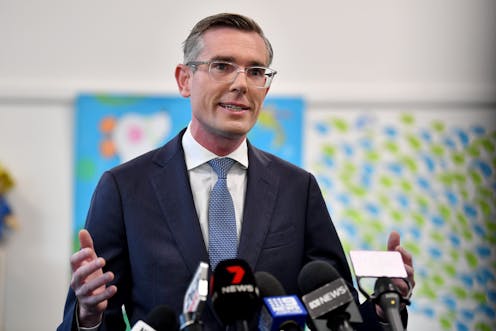Source: The Conversation (Au and NZ) – By Andy Marks, Pro Vice-Chancellor, Strategy, Government and Alliances, Western Sydney University

AAP/Bianca de Marchi
Clear air is essential ahead of an election. Space to make the case to voters. Room to build positive momentum. And yet, hurtling towards a poll in March 2023, the NSW Liberal-National government is gasping for breath.
Questions over the relinquished New York trade office appointment of former NSW Nationals leader John Barilaro have sucked substantial oxygen from premier Dominic Perrottet’s efforts to renew a 12-year-old administration.
With further revelations likely in upcoming parliamentary hearings and the findings of an independent internal inquiry pending, these issue are far from resolved. The frustration within senior Coalition ranks is palpable. It wasn’t meant to be this way.
Determined to avoid the fate of their federal colleagues, Perrottet and Treasurer Matt Kean set out a comparatively progressive reform agenda in the June state budget.
A big focus on the environment, clean energy, targeted cost-of-living relief and $16.5 billion in programs for women saw the economic blueprint labelled “Australia’s first teal budget”. Clear air abounded.
A shift in the vibe
For a moment, a government wounded less than a year earlier by the loss of a relatively popular leader amid a corruption inquiry looked to have achieved a remarkable turnaround. Even the “it’s not illegal” attitude to pork-barrelling seemed to have been eschewed in favour of participatory funding programs like WestInvest.
A spirit of cooperation was emerging. The premier’s push for federal–state health reform with his Victorian counterpart, Daniel Andrews, added to the perception this was a government capable of embracing a political “vibe shift” and rising above party lines for the greater good.
Other signs of maturity were evident in a shift away from the infrastructure boasts in the run-up to past campaigns. On budget night, the treasurer declared:
We must invest in more than just bricks and steel. We must choose to invest in our greatest asset – our people.
With a fresh and notably “constructive” Labor opposition leader in Chris Minns, NSW voters looked set for a contest-of-ideas election rather than the usual partisan arms race. Both parties, it seemed, had understood and adopted the new politics championed federally by the teals. Yet the Coalition is still struggling to convince onlookers it can meet one of the most critical expectations: integrity.
Across the aisle
NSW Labor is not immune. As news broke of the New York appointment, three former Labor parliamentarians were charged with “misconduct in public office”. More than a decade on the opposition benches has proved a steep learning curve for Labor. The Coalition, on the other hand, appears set for some hard learnings of its own.
The federal election result showed how closely voters watch matters of political integrity. It illustrated too that the harshest judgements are being exercised in the safest of Coalition seats. The teal wave crashed in the areas where incumbency was viewed by some commentators as a right rather than a privilege.
Whether the premier can again find the clear air he so sorely needs remains to be seen. Factional loyalties – in the party former Prime Minister Malcolm Turnbull once declared to be factionless – will be tested. Perrottet may have won the top job with overwhelming party endorsement, but it will only take the drift of one or two key allegiances to undermine his position.
The risk is twofold for the premier. Federal-style disaffection among rusted-on Coalition voters is one thing. Percentage drift in key marginal electorates is another.
The sharp end
In Western Sydney alone, three Liberal-held seats are in play. East Hills and Holsworthy in the southwest intersect with large areas that endured hard lockdown during the worst of the pandemic. There is disquiet. Wendy Lindsay, who holds East hills by a two-party-preferred margin of just 0.5 percentage points, was among a clutch of Coalition MPs reportedly opposing the mandatory vaccination of construction workers from hotspot areas.
In neighbouring Holsworthy, Liberal MP Melanie Gibbons, who made a thwarted bid for preselection in the nearby federal seat of Hughes, announced she would resign at the next election. Labor will undoubtedly marshal significant resources to win back a former heartland area on a 3.3 point margin.
The sharpest challenge for the Coalition might just prove to be the third of those marginal electorates, Penrith. Held by Deputy Premier Stuart Ayres, this outer-western Sydney seat on a margin of 1.5 points is an anchor for the Liberals in Australia’s fastest-growing region, for which Ayres also has ministerial responsibility.
In his additional role as the trade minister, Ayres has been drawn into scrutiny over the New York appointment. He insists he maintained “arm’s length” distance throughout the process, a position he believes the inquiry will confirm.
However, in the scramble for political clear air, perception often trumps reality. Regardless of the findings of the upper house and internal inquiries, and irrespective of the reset the premier is seeking, the question of integrity is ultimately one that will be answered by voters.
![]()
Andy Marks does not work for, consult, own shares in or receive funding from any company or organisation that would benefit from this article, and has disclosed no relevant affiliations beyond their academic appointment.
– ref. NSW government slides further into trouble as Perrottet struggles for clear air – https://theconversation.com/nsw-government-slides-further-into-trouble-as-perrottet-struggles-for-clear-air-188018







